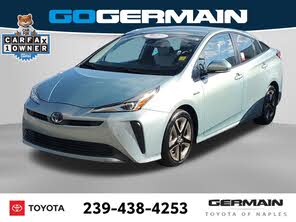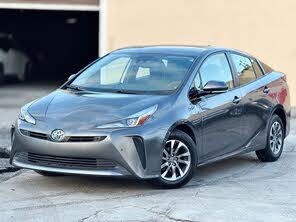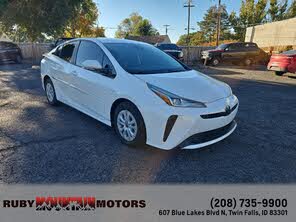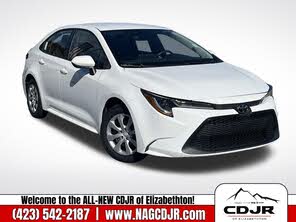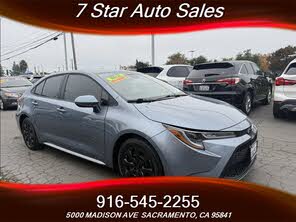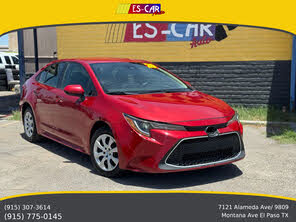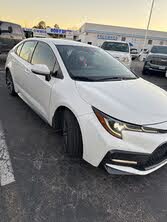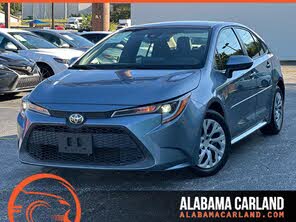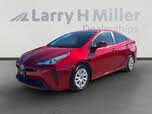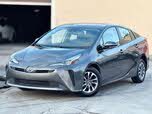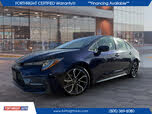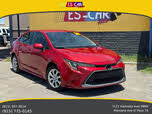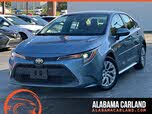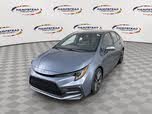2019 Toyota Prius vs 2020 Toyota Corolla
Overview | |
MSRP$23,770 | MSRP$19,600 |
Listings204 | Listings1367 |
Ratings & Reviews | |
User Reviews | User Reviews |
Expert reviews7.3 out of 10 | Expert reviews7.0 out of 10 |
Pros
Cons
| Pros
Cons
|
2019 Toyota Prius Reviews SummaryReliable, efficient, affordable, practical, and safe, the 2019 Toyota Prius checks off multiple boxes on a typical car shopper’s list. The latest version is even decent to drive, but the Prius' styling does the car no favors. For 2019, Toyota tries to tone down the design, revises its trim-level strategy, and adds a new electric all-wheel-drive option to the car. | |
2020 Toyota Corolla Reviews SummaryIf ever a car was to be described as an appliance, the Toyota Corolla was it. Cheap to buy, dependable as a sunrise, thrifty with fuel, and roomy enough for a frugal family, the Corolla faithfully delivered its owners to their destinations without a hint of fuss... or emotion. That changes with the redesigned 2020 Toyota Corolla, which adds a sense of style and a bit of thrill to its longstanding mission. | |
Popular Features & Specs | |
Engine1.8L 121 hp I4 Hybrid | Engine1.8L 139 hp I4 |
Drive TrainFWD | Drive TrainFWD |
Seating Capacity5 | Seating Capacity5 |
EV Battery Capacity0.7 kWh | EV Battery Capacity |
MPG City58 | MPG City30 |
MPG Highway53 | MPG Highway38 |
Engine | |
Engine Name1.8L 121 hp I4 Hybrid | Engine Name1.8L 139 hp I4 |
DrivetrainFWD | DrivetrainFWD |
Fuel Economy | |
EV Battery Capacity0.7 kWh | EV Battery Capacity |
MPG City58 | MPG City30 |
MPG Highway53 | MPG Highway38 |
Interior | |
Seating Capacity5 | Seating Capacity5 |
Safety | |
Front Crash Overall4 | Front Crash Overall5 |
Side Crash Overall5 | Side Crash Overall5 |
Dimensions & Capacity | |
Cargo Space27.4 cu ft | Cargo Space13.1 cu ft |
Curb Weight3010 lbs | Curb Weight2910 lbs |
Height57.9 in | Height56.5 in |
Length180.0 in | Length182.3 in |
Width69.3 in | Width70.1 in |
Wheelbase106.3 in | Wheelbase106.3 in |
Maximum Payload825 lbs | Maximum Payload825 lbs |
Number of doors4 | Number of doors4 |
Overview | ||
MSRP | $23,770 | $19,600 |
Listings | ||
Ratings & Reviews | ||
User reviews | ||
Expert reviews | 7.3 out of 10Read full review | 7.0 out of 10Read full review |
Pros & cons | Pros
Cons
| Pros
Cons
|
Summary | Reliable, efficient, affordable, practical, and safe, the 2019 Toyota Prius checks off multiple boxes on a typical car shopper’s list. The latest version is even decent to drive, but the Prius' styling does the car no favors. For 2019, Toyota tries to tone down the design, revises its trim-level strategy, and adds a new electric all-wheel-drive option to the car. | If ever a car was to be described as an appliance, the Toyota Corolla was it. Cheap to buy, dependable as a sunrise, thrifty with fuel, and roomy enough for a frugal family, the Corolla faithfully delivered its owners to their destinations without a hint of fuss... or emotion. That changes with the redesigned 2020 Toyota Corolla, which adds a sense of style and a bit of thrill to its longstanding mission. |
Video | ||
Popular Features & Specs | ||
Engine | 1.8L 121 hp I4 Hybrid | 1.8L 139 hp I4 |
Drive Train | FWD | FWD |
Seating Capacity | 5 | 5 |
EV Battery Capacity | 0.7 kWh | |
MPG City | 58 | 30 |
MPG Highway | 53 | 38 |
Engine | ||
Engine Name | 1.8L 121 hp I4 Hybrid | 1.8L 139 hp I4 |
Drivetrain | FWD | FWD |
Fuel Economy | ||
EV Battery Capacity | 0.7 kWh | |
MPG City | 58 | 30 |
MPG Highway | 53 | 38 |
Interior | ||
Seating Capacity | 5 | 5 |
Safety | ||
Front Crash Overall | 4 | 5 |
Side Crash Overall | 5 | 5 |
Dimensions & Capacity | ||
Cargo Space | 27.4 cu ft | 13.1 cu ft |
Curb Weight | 3010 lbs | 2910 lbs |
Height | 57.9 in | 56.5 in |
Length | 180.0 in | 182.3 in |
Width | 69.3 in | 70.1 in |
Wheelbase | 106.3 in | 106.3 in |
Maximum Payload | 825 lbs | 825 lbs |
Number of doors | 4 | 4 |
The 2019 Toyota Prius, despite its remarkable technology and efficiency, was not celebrated for its looks. No one ever gazed at a Prius and proclaimed it a stunning automobile. Yet, it had a unique appeal that made it unmistakable. When the second-generation Prius debuted in 2004, it introduced a distinctive boomerang-shaped profile and a split rear glass hatchback which appealed to early hybrid adopters who wanted to make a statement. However, by the time the fourth-generation Prius was introduced in 2016, hybrids had become far more common, and Toyota seemed to push the design further to the edge. Some argued that this design was detrimental to sales, despite the car's practical appeal as a daily driver.
For 2019, the Prius had a new lineup: L Eco ($23,770), LE ($24,980), XLE ($27,820), and Limited ($32,200). Notably, all-wheel drive (AWD-e) was available as an extra $1,400 for LE trim and $1,000 for XLE trim. The test Prius XLE with AWD came in a new color, Electric Storm Blue, and featured upgrades like an Advanced Technology Package, head-up display, and some accessories, setting the price at $32,146. The interior of the Prius looked quite unusual, with a centralized control layout that, while functional, required an adjustment period. Gloss black interior trim, though aesthetically pleasing, attracted dust easily.
By contrast, the 2020 Toyota Corolla, though not regarded as an icon of beauty, carried an aggressive modern look. The redesigned Corolla, especially in SE or XSE trims, boasted an attractive appearance enhanced by the Celestite paint. The angular headlights and the bold front face could appear controversial but might become familiar with time, much like the Honda Civic. The XSE trim exhibited a marked improvement in perceived interior quality, replacing cheap hard plastics with soft-touch surfaces and non-glistening finishes, lending a more upscale feel. However, the shifter reminded drivers of the Corolla's economy car roots, not matching the solidity of higher-end competitors.


















The 2019 Toyota Prius combined a 1.8-liter 4-cylinder engine with an electric motor generating 121 horsepower. The optional AWD system included a 5-kilowatt rear electric motor and shifted from a lithium-ion to a nickel-metal hydride battery. This rear motor powered the rear wheels up to 6 mph and provided extra traction up to 43 mph. Above that speed, the Prius ran like a front-wheel-drive vehicle. The AWD-e affected fuel economy, lowering it to an EPA estimate of 50 mpg from the standard front-drive model's 52 mpg. During testing, an average of 48.6 mpg was recorded over different driving conditions.
The Prius delivered a pleasant driving experience with good ride quality and decent handling, especially in Power mode. The CVT transmission was mostly unnoticeable except for a bit of rolling after choosing Park. The Prius also featured smooth EV driving under 25 mph, regenerative braking, and a quiet cabin in urban settings. On highways, road noise became more prominent, especially with AWD-e, but overall, the Prius proved to be a no-hassle, fuel-efficient option for daily driving.
In comparison, the 2020 Toyota Corolla offered two engine choices. The base L, LE, and XLE trims had a 1.8-liter 4-cylinder engine producing 139 horsepower with a CVT and 16-inch wheels. An upgrade to SE or XSE added a 169-hp, 2.0-liter 4-cylinder engine, a sophisticated CVT with paddle shifters, and an option for a 6-speed manual gearbox. The Corolla XSE excelled in driving dynamics with a smooth, stable ride, thanks to the independent rear suspension, and capable handling. However, the engine struggled with acceleration, creating a bit of a downer during lively driving despite performance-oriented qualities.
Fuel efficiency for the Corolla XSE was rated at 31 mpg city, 38 highway, with an average of 34 combined, though the test car averaged 29.8 mpg due to aggressive driving during test conditions.
The 2019 Toyota Prius provided a surprisingly spacious interior, fitting four adults comfortably. The driver's seat offered manual height adjustment; however, the front passenger seat sat high off the floor and had no height adjustment. Heated front seats and a heated steering wheel were included. Rear passengers had decent space for legs and thighs, but the absence of air conditioning vents made it less comfortable. The Prius's cargo capacity was notable, with up to 27.4 cubic feet behind the rear seats and 65.5 cubic feet with seats folded down (62.7 with AWD-e), rivaling many small SUVs.
On the other hand, the 2020 Toyota Corolla, despite being smaller than a Camry, was practical for family use. However, it lacked several comfort features like rear air conditioning vents and USB charging ports. The Corolla XSE had a lower seating position, making ingress and egress tricky for some people. Though the interior had good soft cushioning and adequate legroom, headroom was an issue for taller individuals. Storage was limited with small cupholders and few storage cubbies. The trunk offered 13.1 cubic feet of space, somewhat comparable to the Prius, but lacked the versatility of a hatchback design.
The 2019 Toyota Prius differentiated its trims by technology offerings. The top-tier Limited trim flaunted an 11.6-inch touch-sensitive display, navigation, premium JBL sound system, and more. The XLE AWD-e tested had a basic setup with a 6.1-inch screen, Bluetooth, and a CD player, though it did include wireless smartphone charging. The technology package promised more than it delivered, and the missing Apple CarPlay and Android Auto integration were notable drawbacks.
In comparison, the 2020 Toyota Corolla came equipped with Toyota's next-gen Entune 3.0 infotainment system, compatible with Apple CarPlay but not Android Auto. Entune 3.0 was user-friendly with well-placed controls and an effective voice recognition system. Corolla buyers enjoyed a variety of services and subscription-based features, such as HD Radio, SiriusXM, and numerous connectivity services. Optional wireless charging was a perk for XSE and XLE models, rounding out a tech-savvy offering in comparison to the Prius.
The 2019 Toyota Prius's safety technologies were impressive but trim-dependent. While the Limited trim offered automated Safety Connect features, other trims still enjoyed comprehensive Toyota Safety Sense (TSS) including adaptive cruise control, forward-collision warning, automatic braking, lane-keeping assist, and automatic high beams. For added safety, the LE trimmed up offered blind-spot monitoring and parking assist systems. The Prius earned top scores in crash tests, securing a 5-star rating from federal tests and a Top Safety Pick nod from the Insurance Institute for Highway Safety (IIHS).
The 2020 Toyota Corolla, consistent across all trims, included the TSS 2.0 suite with enhancements like low-light pedestrian detection and lane tracing assist. Blind-spot monitoring was available (standard on XSE and XLE trims). The system showed impressive accuracy and subtlety during operation. However, the lane departure warning sound was irritating. The Corolla earned a similar recognition in safety, with a 5-star frontal-impact rating from the National Highway Traffic Safety Administration (NHTSA) and a Top Safety Pick rating from IIHS.
CarGurus highlights

According to CarGurus experts, the overall rating for the 2019 Toyota Prius is 7.3 out of 10, while the 2020 Toyota Corolla scores 7.0 out of 10. If you are looking for a car with outstanding fuel efficiency and greater cargo capacity, the Prius edges out slightly. However, for a more engaging driving experience and modern technology integration, the Corolla is a solid choice. Nonetheless, based on these ratings, the Prius is the recommended buy for its efficiency, practicality, and higher overall score.
Choose the 2019 Toyota Prius if:
- Exceptional fuel efficiency and eco-friendly performance are your top priorities.
- You need versatile cargo space comparable to small SUVs for an active lifestyle.
- The availability of all-wheel drive is crucial for handling various driving conditions.
Choose the 2020 Toyota Corolla if:
- You seek a well-rounded compact sedan with superior ride quality and modern, aggressive styling.
- Cutting-edge technology and Apple CarPlay compatibility are important for your daily commute.
- You value high safety standards with a suite of active driver-assistance features across all trim levels.
CarGurus highlights

According to CarGurus experts, the overall rating for the 2019 Toyota Prius is 7.3 out of 10, while the 2020 Toyota Corolla scores 7.0 out of 10. If you are looking for a car with outstanding fuel efficiency and greater cargo capacity, the Prius edges out slightly. However, for a more engaging driving experience and modern technology integration, the Corolla is a solid choice. Nonetheless, based on these ratings, the Prius is the recommended buy for its efficiency, practicality, and higher overall score.
Choose the 2019 Toyota Prius if:
Shop Now- Exceptional fuel efficiency and eco-friendly performance are your top priorities.
- You need versatile cargo space comparable to small SUVs for an active lifestyle.
- The availability of all-wheel drive is crucial for handling various driving conditions.
Choose the 2020 Toyota Corolla if:
Shop Now- You seek a well-rounded compact sedan with superior ride quality and modern, aggressive styling.
- Cutting-edge technology and Apple CarPlay compatibility are important for your daily commute.
- You value high safety standards with a suite of active driver-assistance features across all trim levels.

By: CarGurus + AI
At CarGurus, our team of experienced automotive writers remain at the heart of our content operation, conducting hands-on car tests and writing insightful guides that are backed by years of industry experience. To complement this, we are harnessing AI to make our content offering more diverse and more helpful to shoppers than ever. To achieve this, our AI systems are based exclusively on CarGurus content, ratings and data, so that what we produce is both unique to CarGurus, and uniquely helpful to car shoppers.


